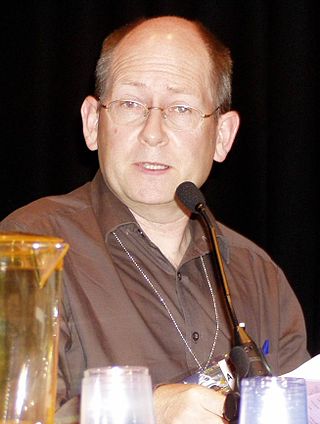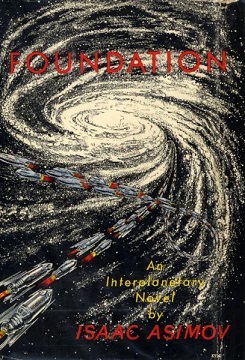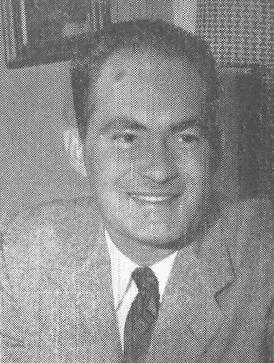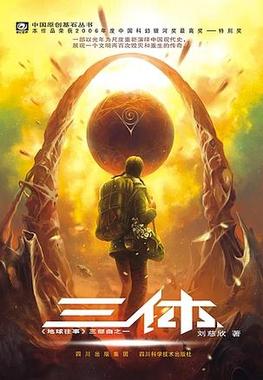
Stephen Baxter is an English hard science fiction author. He has degrees in mathematics and engineering.

The Foundation series is a science fiction book series written by American author Isaac Asimov. First published as a series of short stories and novellas in 1942–50, and subsequently in three books in 1951–53, for nearly thirty years the series was widely known as The Foundation Trilogy: Foundation (1951), Foundation and Empire (1952), and Second Foundation (1953). It won the one-time Hugo Award for "Best All-Time Series" in 1966. Asimov later added new volumes, with two sequels, Foundation's Edge (1982) and Foundation and Earth (1986), and two prequels, Prelude to Foundation (1988) and Forward the Foundation (1993).
A sleeper ship is a hypothetical type of crewed spacecraft, or starship in which most or all of the crew spend the journey in some form of hibernation or suspended animation. The only known technology that allows long-term suspended animation of humans is the freezing of early-stage human embryos through embryo cryopreservation, which is behind the concept of embryo space colonization.

Rama II is a science fiction novel by Gentry Lee and Arthur C. Clarke, first published in 1989. It recounts humankind's further interaction with the Ramans, first introduced in Rendezvous with Rama. Written primarily by Lee, Rama II has a distinctly different writing style than the original, with a more character-driven narrative and a closer-to-contemporary mindset, ambience and human relations than the first novel's more futuristic tones. Rama II is the first novel of the "new" Rama series, as Rendezvous with Rama is not always counted as part of it. The Rama series includes two more sequels: The Garden of Rama and Rama Revealed.
This is a bibliography of the books written or edited by Isaac Asimov, arranged alphabetically. Asimov was a prolific author, and he engaged in many collaborations with other authors. This list may not yet be complete. The total number of books listed here is over 500. Asimov died in 1992 at age 72; a small number of his books were published posthumously.

Houston, Houston, Do You Read? is a novella by James Tiptree Jr.. It won a Nebula Award for Best Novella and a Hugo Award for Best Novella in 1977.
Captain Future is a pulp science fiction hero – a space-traveling scientist and adventurer – originally published in the United States in his his namesake pulp magazine from 1940 to 1944. The character was created by editors Mort Weisinger and Leo Margulies. The majority of the stories were authored by Edmond Hamilton. A number of adaptations and derivative works followed.

Nicholas Julian Zapata Sagan is an American novelist and screenwriter. He is the author of the science fiction novels Idlewild, Edenborn, and Everfree, and has also written scripts for episodes of Star Trek: The Next Generation and Star Trek: Voyager. He is the son of astronomer Carl Sagan and artist and writer Linda Salzman.

The Wind from the Sun (ISBN 0-15-196810-1) is a 1972 collection of science fiction short stories by British writer Arthur C. Clarke. Some of the stories originally appeared in a number of different publications. A part of the book was included in CD on board the Planetary Society's solar sail, Cosmos 1.

Mundane science fiction (MSF) is a niche literary movement within science fiction that developed in the early 2000s, with principles codified by the "Mundane Manifesto" in 2004, signed by author Geoff Ryman and the "2004 class" of the Clarion West Writers Workshop. The movement proposes "mundane science fiction" as its own subgenre of science fiction, typically characterized by its setting on Earth or within the Solar System; a lack of interstellar travel, intergalactic travel or human contact with extraterrestrials; and a believable use of technology and science as it exists at the time the story is written or a plausible extension of existing technology. There is debate over the boundaries of MSF and over which works can be considered canonical. Rudy Rucker has noted MSF's similarities to hard science fiction and Ritch Calvin has pointed out MSF's similarities to cyberpunk. Some commentators have identified science fiction films and television series which embody the MSF ethos of near-future realism.

Richard Wilson was an American science fiction writer and fan. He was a member of the Futurians, and was married for a time to Leslie Perri, who had also been a Futurian.

Ancient astronauts have been addressed frequently in science fiction and horror fiction. Occurrences in the genres include:

The Three-Body Problem is a 2008 novel by the Chinese science fiction author Liu Cixin. It is the first novel in the Remembrance of Earth's Past trilogy. The series portrays a fictional past, present, and future wherein Earth encounters an alien civilization from a nearby system of three Sun-like stars orbiting one another, a representative example of the three-body problem in orbital mechanics.
Suspended animation in fiction refers to the temporary cessation of life processes experienced by fictional characters, followed by their subsequent revival. This process is commonly employed as a plot device in science fiction narratives. It is frequently utilized to transport a character from the past to the future or to facilitate interstellar space travel, which necessitates an extended journey for months or years. In addition to accomplishing the character's primary objective in the future, they often encounter the unfamiliarity of a new world, which may bear only faint resemblance to their previous surroundings. On occasion, a character is portrayed as possessing skills or abilities that have become lost to society during their period of suspension, enabling them to assume a heroic role in their new temporal setting.

World of Tomorrow is a series of animated science fiction short films written, directed, produced, animated, and edited by Don Hertzfeldt.

Becky Chambers is an American science fiction writer. She is the author of the Hugo Award-winning Wayfarers series as well as novellas including To Be Taught, if Fortunate (2019) and the Monk & Robot series, which begins with the Hugo Award-winning A Psalm for the Wild-Built (2021). She is known for her innovative world-building and character-driven stories, and is a pioneer of the hopepunk genre.

This Is How You Lose the Time War is a 2019 science fiction fantasy LGBT epistolary novel by Amal El-Mohtar and Max Gladstone. It was first published by Simon & Schuster. It won the BSFA Award for Best Shorter Fiction, the Nebula Award for Best Novella of 2019, and the 2020 Hugo Award for Best Novella.
"I Sexually Identify as an Attack Helicopter" is a military science fiction short story by Isabel Fall, published on 1 January 2020 in Clarkesworld Magazine. The story relates the experience of Barb, a woman whose gender has been reassigned to "attack helicopter" so as to make her a better pilot. It was a finalist for the 2021 Hugo Award, under the title "Helicopter Story".

A Psalm for the Wild-Built is a 2021 solarpunk novella written by American author Becky Chambers, published by Tor Books on July 13, 2021. It is the first book in the Monk & Robot duology, followed by A Prayer for the Crown-Shy, which was released on July 12, 2022. It won the Hugo Award in 2022.














